Punctuation
The Fruits of 46 Hours on Amtrak
Time seems to obey the grammatical conventions of the written page: A colon invites the mind to consider a pointed notion — a dash leads the reader to ponder, and a comma signals that one can finally take a breath. Often, the comma’s space for rest comes mercifully in a long sentence. Perhaps there are harried pages that stretch so long and unruly that the reader can only be given rest with a paragraph break, a divider line, or a blank page signalling a new chapter. And just as a funeral or a baptism builds a clarifying gateway in biographical time, and as the hiker’s mountainside shanty or lean-to allows for rest, so too with the moments that punctuate life’s stanzas. As we go, we must mark time; we must pause and reflect before diving into the next page or chapter — sometimes, we must even pause so thoroughly that we could only be transitioning into “Book Two,” “Volume Six,” or some distant edition the likes of which we never imagined writing.
And indeed, there are many “chapters” of my own life I hardly imagined I’d ever “write” — which is to say there are whole seasons and years I have now passed through that I doubted I’d ever live. There were times when I lived so hard and wild I could barely conceive of a future for myself; eras of my own biographical notation that seemed unendingly fugueish and warying, where no restful ellipses or breaks in the tiring sentences of my years seemed remotely possible. And yet — corned beef hash in a rainy diner in Maine might be the gentle call, reminding me that time does indeed pass. A hearty handshake between rusticated boys (boys so old they appeared to be men) might tell me that I’d reached a momentary eddy in the months of life where I might rest and reflect and inwardly make the silent inquiry I have always made at such moments: “What could possibly follow this? How did this all come to pass? What next?”
Of all the forms and flavors of temporal punctuation perhaps none surpass a lengthy Amtrak ride. As I and my woman boarded the train in Shelby, Montana on November the second, we knew we’d be in motion for forty-six hours. The glistening metal tube — fever-dream of the old Futurists — crept out of the station and onto the barren plain. Our good ‘land-ship’ seemed to ache as she pulled out, heaving gently. Then, moment by moment, she gathered speed as a sprinting boy gathers up the gumption to run faster. A jostle sent us backward in our seats — we were suddenly flying across the Great Plains. We reclined in our chairs, neatly organizing bags and baskets of snacks as if they were provisions for a vision quest. Moody filtered sunlight crept across the face of my beloved as she began to nap; her head lay gingerly against the window as the old Amish ladies hububbed in hushed tones of Pennsylvania Dutch and an old black man from Chicago snored. We would not arrive in Chicago for almost thirty hours.
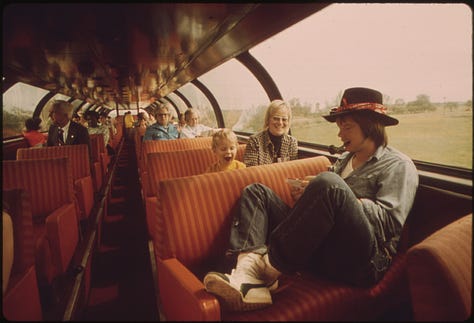

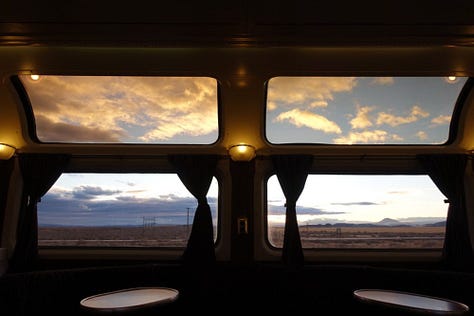
To be aboard the train is really to be nowhere. It is a place-between-two-worlds; neither in Montana nor in Utica. After a while, Minot rolled by, then Rugby, then Devil’s Lake. We were not thinking about the traffic; we were not walking, we were not stopping for gasoline and honey-buns. There were no ‘check engine’ lights or popped innertubes or boot-blisters, no turbulence or stewardesses passing out peanuts. We were outside of every conceivable concern, temporary royalty outside of time, flying across the glistening steel of the American railroad system — a world of wrought metal and wooden ties so pregnant with the mythos of this nation that one feels some awe as they go, dreaming the dreams of Manifest Destiny as they sleep. And in time, the sun disappeared over the Western sky, and the passengers began to drift into a somniferous state between wakefulness and true sleep.
Nights on Amtrak’s Empire Builder train are alost heavenly, luminous with the blue overhead lights of the Coach section. We sat on the second story of the train, perhaps fifteen feet from ground level or higher; the darkness outside was a blur of distant lights broken only by occasional brief stops in tired old towns on the Plains. The blue light recalled a nautical theme or the lighting in a mystical, abstract theatrical scene. Everyone was asleep, and I was alone in this utterly liminal world of ‘nowhere-ness’, free to reflect and recall, receiving at once an equal measure of wearying tiredness that all travelers know and, at once, a profound rest knowable only to the train traveler. In this place, I slipped into a private haven where the chapter of life we’d left behind in Shelby could be digested.
By then, I’d been on the road for over two months. Yet that night, I wasn’t thinking so clearly about days on the calendar — I’d convinced myself that it’d been not two but three months of constant travel. Perhaps this is because something about these months had been especially tiring. As the freakish lights of the darkened Dakotan void bled into one another as vast colored lines in my line of sight, I pondered why these months had felt so gravely tiring. I’d first left home not a few weeks after turning seventeen, and had since failed — for twelve years — to remain in any single place for longer than a few months. No stranger to uprooting myself and running the roads and rails both as a vagabond and as a military member, there seemed to be no reason for me to feel so utterly disrupted by the miles I’d made in these weeks and months.
Yet exhaustion visits not merely as a physiological phenomenon but as a spiritual condition. My stint in the Coast Guard had run me down; I’d been locked up during the coronavirus outbreak — a sort of ‘extended quarantine period’ on two different military training centers involving three-and-a-half months of what amounted to solitary confinement. Alone, I sat in a concrete-block room with a small window, absolutely forbidden to go outdoors or to interface with another human being. These months constituted a dark inversion of my days as a freewheeling vagabond; I’d known extreme freedom in that former life of mine, and my confinement amounted to its radical opposite — and it decimated me. Shortly after this time, my ex-girlfriend, for whom I’d joined the military to begin with, had aborted our child and informed me that we were no longer together. Now, as the wheels of the train rolled beneath us, I’d snagged the tickets on what would be my last Active Duty military discount. So far as I could tell, my DD-214 — that blessed document stating that I’d completed four years of honorable service to these United States — was in the mail. I was no longer an enlistedman, and that bleak chapter was over.
When one leaves the US Military, they are constantly chided and warned about how hard it is “on the outside”. I had to be formally counseled on veteran suicide and was made to sit through numerous Powerpoint presentations about veteran homelessness. Salty old Chiefs who’d joined the service straight out of High School regaled me with tales of old Seamen they’d known who separated from the service and promptly began smoking crack cocaine, or drove themselves to suicide on oil rigs or philandered their way into prison in bleak cubicle jobs. The most extreme stories lingered longest in the minds of careerist military members, and all of them came out to play. Questions begin to strike, first from chortling imbeciles, then from friends, then from my dear old mother — “what will you do now?” And even now, twenty days have passed since I possessed the title of Petty Officer, and I continue to wrestle with ideas of what ought to come next.
For unlike other military members, my only formal work experience was in the Coast Guard. In spite of joining at the age of twenty-five, I’d never worked anything approaching a “real job” prior to enlisting. I’d never even worked a dead-end job save for moonlighting as a lumber department lackey at Lowe’s when I was waiting for boot camp. Alarm clocks were foreign to me until enlisting. I’d spent the first half of my twenties on a thousand wild goose chases, running state-to-state as a hitchhiker, sleeping under the stars for months on end — often without any money at all. I ate donuts and potatoes from the dumpster, I cooked rice and lentils on camp stoves in city parks and in deserts and walked at least fifteen miles every day. I was sturdy and tough, exuberant and wild, in the best shape of my life. When I joined the Coast Guard, I figured a stint in the military would only strengthen me — that if I had to ‘render unto Caesar’ I might as well do it intensely, entering a brotherhood of rough-and-tumble boys who fought the sea for a living.
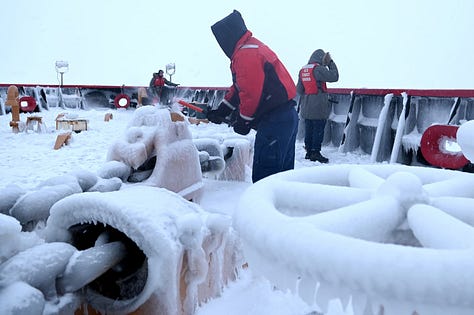
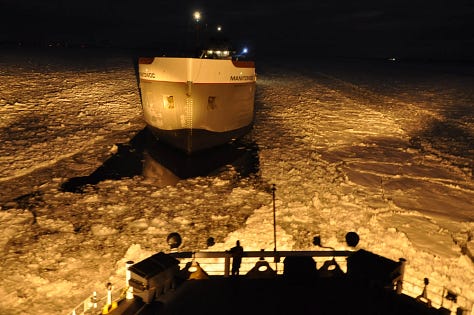

No brotherhood did I find. Instead, I entered a living bureaucracy operated by dark-eyed men who intermittently stared at their pension fund reports, Maintenance Procedure Cards, and hardcore pornography. Haggard hangovers, hiding from higher-ups, and computerized trainings about suicide were the main course — and the cohort of zoomers I’d been stationed with all seemed to have joined only for “free college,” having almost no interest in vagaries like “brotherhood”. Occasionally, we’d have a serious case — I was on an icebreaker in Michigan that did medevacs and broke massive freighters free when they were icebound and headed for shoal water. Engine casualties became my thrill. I shaved my head and became addicted to the violently surging seas of Lake Superior and Lake Huron, and more than once I dove into the bilge amid gushing springs of hot oil to crimp a leaking pipe in heavy seas. But in only a few months, covid would begin, and my job would change. Piece by piece, any semblance of swashbuckling adventure died, and I was finally reduced to my lowest form — solitary confinement. It was in my dark little barracks room at the height of covid that I would be altered. Ever since, I have learned what the word “anxiety” means.
On Amtrak, “sleep” is not really sleep. Like Rip Van Winkle, one is living in a dreamlike state, sleepless yet rested, wandering through the seldom-transited voids of the mind and memory. The mind is breathless, flickering between ecstasy and exhaustion, rocked by the train in a manner that simultaneously recalls the cradle and the ship in stormy seas. And here, the memories of my enlistment — and the nervous wondering regarding what might follow these years of mine flitted through the corridors of my mind. What might transpire upon de-training in Utica was not knowable, and yet my time in Montana was behind me. The success of the previous journey in the American West was plainly visible in the form of the woman asleep next to me — we fell in love and had newly begun to hew to one another, and as I write this, she is across from me, revelling in the morningtime not only of the day, but of our lives. We wrote letters and talked on the telephone, becoming mutually entranced, until in a paroxysm of boyish passion I drove my car thirty-seven hours across the country to meet her and her family. My Amtrak trip west just two months ago was the return journey — like Indiana Jones, I was reaching into foreign lands to seize my treasure, and on this train, I was bringing my bride home in a most ancient fashion; sending her hurtling eastward at my side toward a world that would be entirely new to her.
Now, what can I offer her? A modest sum now graces my bank account — the most I have ever possessed in my life. And on a whim during covid, I purchased a house on the Canadian border in New York State for a song. A tiny house, a tiny mortgage, and a chunk of savings that most would laugh off as beer money are my raw materials; yet some anxiety lingers from these previous years — I have something that I must slough through, a monkey to get off my back, a gnawing sense that I am half the man I was before I swore my Oath to serve this country.
Many who know me well know intuitively that I was born to travel. I began to read at an exceedingly early age, preferring alamanacs and encyclopedias to story-books and novels. I toted my atlas around with me daily as a boy, constantly surveying the wide world from the library desk and from the window in my bedroom. I devoured anything I could read about Paraguay and Mongolia and Wyoming; I dreamed of Milan and Tierra Del Fuego by bicycle or by foot. I started to sleep outdoors more often; putting myself through trials of all sorts, fording whitewater streams, climbing high trees, walking ten, twenty, thirty miles at a time with a heavy backpack. I called it “hobo college”.


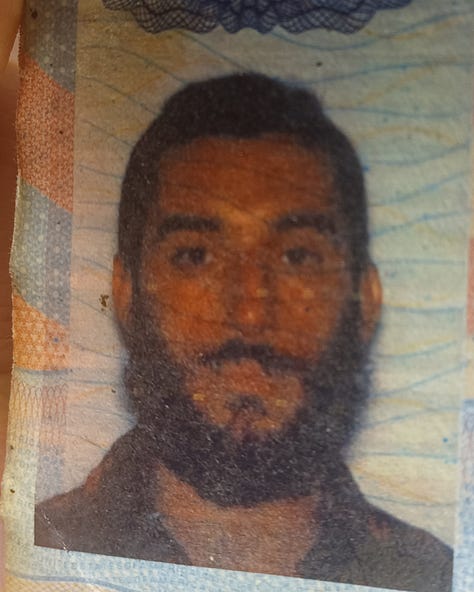
But perhaps more than any of this, I possess the personality of a world traveler. I am high in openness but obey a strict personal code; I am tall enough to be imposing if necessary but emotive enough to be affable. When exposed to sun, I can begin to appear nearly ethnic — or, in the words of one Border Patrol agent who arrested me in Sierra Blanca, Texas years ago, I appeared to be “the most ethnically-ambiguous white man [he’d] ever seen”. I adopt the patois of those around me almost immediately and can quickly learn local slang and chunks of the native language effortlessly. When I employ a new style of dress, it appears perfectly natural — a keffiyeh, an Oregonian raincoat, overalls, or the tweed suit of a French flaneur would all suit me as if I’d worn them all my life. And those who’ve traveled rough with me know that when the proverbial “shit hits the fan”, I am resourceful and endurant — capable of moving through any amount of difficulty with an almost singular nimbleness and resolve. I say none of this to toot my own horn, but to publicly remind myself that I am not as empty, dead, and inept as my imbroglio in the covid-era military would have me believe.
To travel feels like my Cross to bear in this life; and yet like any Cross — it is heavy. When I purchased my little house up on the border, I sought the opposite of travel: seclusion and deep rest. I wished to ‘retire’. So serious was my desire for renunciation that at that time I was privately in conversation with the Abbot of a Franciscan order of Friars, as well as with the local Diocese — weighing the possibility of becoming a Catholic Friar or a Diocesan Hermit. Marriage seemed downright implausible. Travel seemed unthinkable. I needed to renounce my status as a traveling man; after twelve years of itinerance and obscurity, I was ready to “die to the world” and to ensconce myself in a patch of soil as thoroughly as an oak tree. I went prayerfully and to my shock was led to the woman who now sits across from me — but this thread of ‘monastic’ thinking visits me still, and I have not completely moved through it.
And so as I traveled through the American West in the events leading up to boarding the Amtrak at Shelby, it was on that train that I realized I was not merely traveling through the West as I had done so many times before. I was traveling through a love story. I was traveling through my transition from the military back to reality. I was traveling through the dark matter that had been stirred up in my soul during my “quarantine,” that void between fixity and nomadism. Voices deep within me barked madly for home, almost rabid for my little village. I talked incessantly of home and of remaining there forever — perplexing the Gypsy woman with whom I was traveling. Some ailment of the heart would be cured, I thought, by a complete return to the somber little hamlet that made me the man I am.


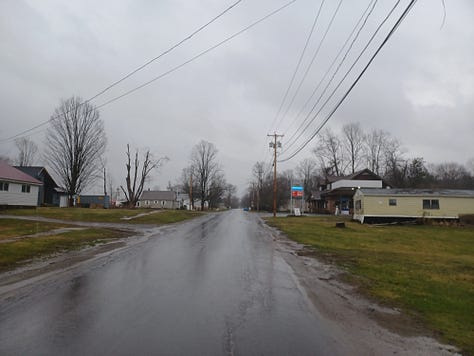
But the road is what made me who I am. The village is the mother; the originator, the nest from which a certain type of man ought to fly. We passed over the Mississippi River, where bald eagles were flying. I sipped coffee, conflicted as I passed that shining boundary between “West” and “East”. The train slid homeward, and I was of two minds.
We arrived on November fifth — the day of the Daylight Savings time change. Everyone was sick. No one seemed especially enthused at our arrival. The whole sky was dark, dark as Upstate New York ever is. The marbled columns of the train station stood erect, echoing murmurings of the few passengers who disembarked in Utica. We rode up to my best friend’s new house — the furnace had died and the air was cold. He was so sick he was on and off the toilet. His wife looked tired. He looked to be on the edge of death; though he was sick, through his illness I detected a deeper malaise. I expected the trumpets to ring out; for fanfare to bustle when I made my declaration that I was home to stay. I expected the doors of my uncle’s trailer to open, for chortling deals to be made, for all of the town’s affairs to boil over into deep joy at my homecoming. Instead, my declarations fell on tired, baggy eyes.
They all knew I would not actually stick around.
The true vagabond is, at times, almost a sort of clown — when merriment is called for, he lavishes his audience with it, causing tides of hilarity to rise in the hearts of all; in him, the dream of human freedom is secure and on display to all as a symbol of hope — a vicarious gift and an avatar for the receipt of good-will and blessings. But when he is disheveled and his vagabondage disturbed, he is as a sad clown, a placeless entity that cannot rest, a slithering spirit who wafts with a disgruntlement few can understand. In such a state, he may become a monk, he may hang himself in a Parisian hotel room, he may slug liquor or swear oaths or sign paperwork, deepening his confusion at every turn. He can only be liberated by walking, for, as Saint Augustine once sagely said — “solvitur ambulando,” meaning “it is solved by walking.” He must start again, as he did at the beginning. And as the vagabond sets off again, the stars are again put in their rightful place, and order is restored not only in himself, but in his world.
Had we walked to Utica from Montana it’d have taken about five months. If we’d walked the 2,112 miles, the two-day soliloquy we granted to the Amtrak would’ve boiled over into an interlude so long it would’ve comprised its own chapter — if not a book in and of itself. The exhaustive run-on sentence that life so easily becomes would’ve been stilled; its architecture might’ve been reconfigured and smoothed over into a poetical mysticism — an opaline world of simple, rhythmic utterances would’ve replaced the frazzled ramblings of the one whose verbiage is tense and automatic and restless. Footfalls upon footfalls, drops of rain, cups of tea, nibblings in the grocery parking lot, the flapping of the tent walls in wind, the rambling of storekeepers and the mooing of cows. Perhaps if the human project is to live well and beautifully — to ‘write’ life’s hours, line-by-line, crafting them into a shape which graces the mind of the reader rather tham pummels them with mad litanies and technical sputtering — then our true aim ought to be that of disabusing ourselves of the run-on sentence.
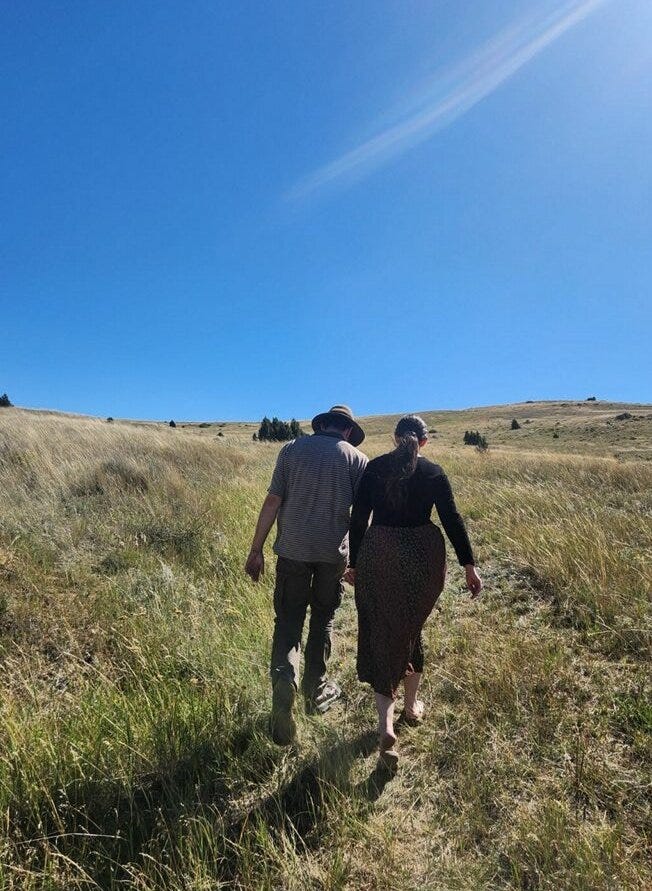
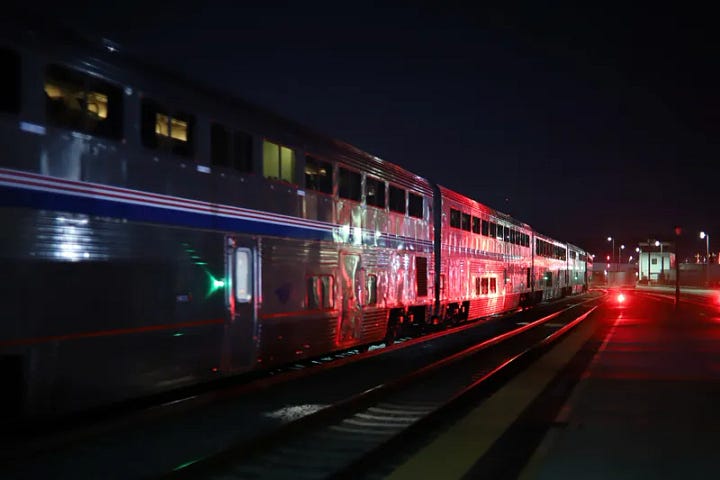
The structure of restful activity in modern life so often takes as a foregone conclusion that life will predominantly be a run-on sentence — that life’s moments will bunch together like cells in a tumor, that trumpets will blare and sirens will spin as the daily activities of man come to mirror the ghastly cities his culture so prizes. One awakens to a rude punctuation of sleep; the bloody screech of the alarm clock stirs a sleeping fellow from rest. They leap up, dragging razors across their bodies, wolfing down clumps of calories, igniting engines, accelerating, talking on the telephone, toiling and sprinting in this fashion for weeks and months at a time. Then — a vacation. Mini vacations as they read prosaic novels on the subway train or pour a glass of wine. A period at day’s end — a signing-off before again plunging into delirium. And lest the run-on sentences of life be shortened, the Amtrak is scorned. “Why not fly? The Amtrak sounds like a pain in the ass.” Walking becomes a chore, and the notion of walking some vast distance strikes as inconceivable.
Ever since my quarantine nightmare, the textual structure of my life’s hours have resembled the nail-biting ravings of a man in confinement. Save for accidental moments where the mind descends into blackness from sheer exhaustion, or, where more deliberate and wholesome, the comforting utterances of the Latin Mass — “dominus vobiscum” — I have been riding the whitewater of mental chaos unabated for several years now. I believe if the Amtrak journey has yielded me anything, that this winter is the time for a long walk. Shall it be Sicily or Sonorra? Taiwan or Texas? Perhaps the Natchez Trace calls me, or the Camino in Spain, or the springtime Outer Banks. Perhaps I do not wish to figure it out in advance, but merely to pack my things and head to the station, submitting myself to the whims of fate as a penitent, praying that the good earth can guide me to the solace of good punctuation. And, like an obsessive and mystical calligrapher, I will spend the winter perfecting the comma. Drawing them again and again until I am lulled into peace and meditatio.
The winter’s exercise will be a study in unraveling darknesses that layer like ghastly onions, and in rising again into the form which is my vocation to accept, remembering Saint Augustine’s wisdom: Solvitur Ambulando.


"in him, the dream of human freedom is secure and on display to all as a symbol of hope"
This is why I read everything you publish on here.
This is so beautiful! I am looking forward to being at your side as you perfect the comma!!